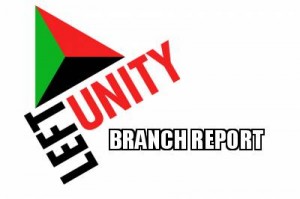 Our meeting on Thursday, October 2 agreed to hold another one in a week’s time to debate conference motions, so mine on the federal republic wasn’t heard this week.
Our meeting on Thursday, October 2 agreed to hold another one in a week’s time to debate conference motions, so mine on the federal republic wasn’t heard this week.
The reason was that a meeting on Ukraine had been arranged. I thought there would be a debate from comrades with opposing views, but those of Richard Brenner (of Workers Power) and Joseph Healy complemented each other. Their thesis was that there is an “illegitimate far-right regime” in Kiev, which “the US and EU governments rushed to back”. The motion comrade Brenner circulated called on the UK government to “break all ties” with the Kiev regime and for LU to affiliate to the campaign, Solidarity with the Anti-Fascist Resistance in Ukraine.
The motion was one-sided in that it did not mention Russia at all. Comrade Brenner said in the debate that this was because Russia was not actually threatening Ukraine or the right of Ukrainians to self-determination – it was the right of self-determination of Russians in eastern Ukraine that was under attack. When there was a good deal of uncertainty about supporting the motion, comrade Brenner suggested that the final clause on affiliation to the campaign be not voted on. The meeting accepted this, and the motion was carried with one against. Several comrades abstained, including myself. While it contained much to agree with, the one-sidedness of the motion meant that it was unsupportable.
At the beginning of the meeting, a smart-looking comrade Brenner seemed in good humour. When I joked that there was no need for him to wear a suit to address us, he responded in kind – and then asked ironically if I wouldn’t mind standing in for comrade Healy on the disputes committee while he was otherwise engaged addressing our meeting.
Afterwards, when I handed out the current Weekly Worker, Joseph commented that the paper was connected to one of the DC cases he was involved in – no prizes for guessing which one. When I stated that it just wasn’t right to hear such cases in secret, Healy replied that people were concerned that anything they might say might be reported in the Weekly Worker.
At this point, comrade Brenner intervened, saying something like: “Isn’t it funny that those who demand transparency from everybody else are the least transparent themselves?” I asked him in what way he thought we weren’t transparent. At that point, he seemed to lose his cool. I couldn’t make out his angry response as he had started to leave the room and other people were chatting. But I caught up with him outside and enquired again. The conversation went something like this:
RB: I don’t have to talk to you.
PM: Of course not, but I didn’t understand what you meant.
RB: Why don’t you write about it in your paper?
Peter Manson